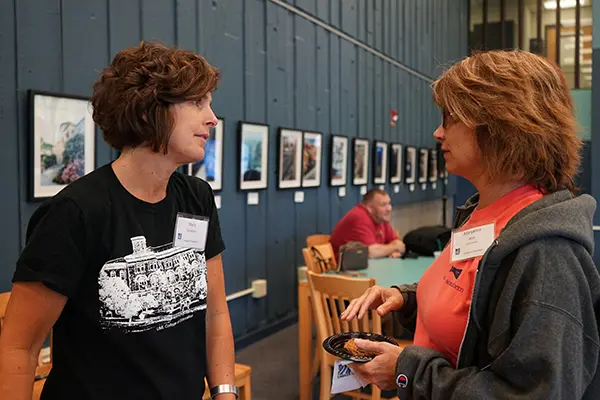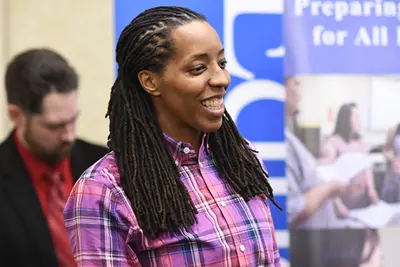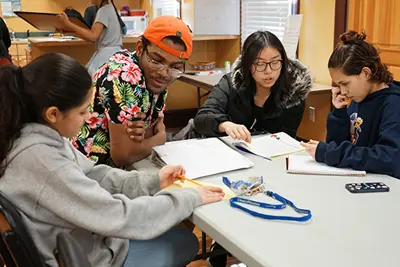Programs Ranked No. 8 Nationally by U.S. News & World Report
 Image by K. Webster
Image by K. Webster
07/16/2018
By Katharine Webster
Summer vacation? Not for these teachers and educators.
They’re all in school, earning doctorates in education (Ed.D.) online. And for one week each July, they come to UMass Lowell for a kind of reverse vacation: face-to-face course meetings, workshops and research presentations that launch them into the next year of study.
“It’s like old home week,” says Janelle Campbell, assistant director of special education for the Waltham public schools. “You see friends. You see them on the computer all year, but now you can catch up in person.”
Campbell and 18 other students are starting the third and final year of the new Leadership in Schooling online program, leading to the doctorate in educational practice (Ed.D.), created at the same time that the College of Education began an on-campus Ph.D.
 Image by K. Webster
Image by K. Webster
The other online graduate programs offered through a partnership between the College of Education and the Division of Online and Continuing Education are: master of education administration; education specialist in administration, planning and policy; master or education specialist in reading and language; and master of curriculum and instruction, with options in autism studies and science education.
The Ed.D. Leadership in Schooling program – which also has a STEM education option – gives working teachers and educators the skills to evaluate existing programs, design new ones and address specific, local problems in their own schools and districts.
Students say they love the program’s small size and systematic structure, which takes them through research and evaluation basics to defining a “problem of practice” they will address in their dissertation research their third year.
“We get an opportunity to build a skill set that truly bridges theory to practice,” says Christopher Clinton, who is gearing up to begin his thesis research.
Clinton, a lecturer in STEM education and teacher development at UMass Dartmouth’s School of Education, says he can apply what he’s learning in the doctoral program to his work.
 Image by K. Webster
Image by K. Webster
Campbell, who has risen from teacher through turnaround principal for an underperforming school to district administrator, is also embarking on the third year of the program. She will research and recommend improvements to special education evaluations in her district for her thesis. A disproportionately high number of students whose first language is not English are identified as being in need of special education services, she says, not only in Waltham, but regionally and nationally.
“I want to look at the process used by a child-study team in a district that does a better job with students who are linguistically and culturally diverse, so that we can improve our own process,” she says.
That’s just the kind of “problem of practice” the Ed.D. program was designed to help educators address, says Assoc. Prof. Stacy Szczesiul, who, with Assoc. Prof. Phitsamay Uy and faculty in leadership and STEM education, helped design the new degree and now serves as coordinator. The UML program is also a member of the Carnegie Project on the Education Doctorate, a consortium of universities that prepare practicing educators to use research to effect change in K-12 schools.
That practical focus, the STEM education option and the program’s small size – a maximum of 28 students each year – have helped the online Ed.D. take off quickly, Szczesiul says.
 Image by K. Webster
Image by K. Webster
Mariel Kolker, a physics and engineering teacher at Morristown High School in New Jersey, says she chose UMass Lowell for its high rankings and the STEM education option. After only one year in the program, she has already learned things that will help her entire school, she says.
“It’s a win if I stay in the classroom and it’s a win if I go into leadership,” she says.
Kolker also applauded the program’s structure and the cohort model, which gives students an incentive, and peer support, to stay on track.
Andrew Chen, a fifth-grade teacher in a Chinese immersion program at Elder Creek Elementary School in Sacramento, Calif., and a member of the newest cohort, says he applied to UMass Lowell because of the STEM education option, the one-week residency requirement and the online flexibility. He’s already taken his first two classes online, but enjoyed meeting his classmates in person – and getting advice from students who are further along in the program.
“It’s really good to see there are other students who have gone through it, and they survived,” he says. “And I get comfort from the level of faculty support.”




